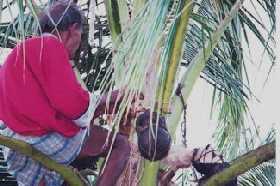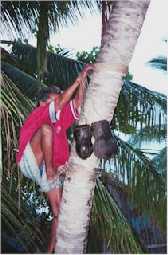|

A toddy tapper practicing his ancient art. (photo: Huvas online)
Toddy is used in several different ways. In the fresh form, it makes a tasty drink. After boiling it thickens to a honey like liquid that is eaten with rice. After more boiling it concentrates to 'karu hakuru', a thick paste, which is also eaten with rice. When fermented toddy becomes an alcoholic beverage. Islanders know that adding rice grains to the mixture leads to better fermentation. But it is generally acknowleged that they don't drink alcohol. So the mixture is left to ferment longer and becomes vinegar in about 40 days.
In the beginning of twentieth century, toddy played an important role in the economy of the Southern three atolls of the Maldives. These three atolls those days engaged in direct import/export trade with the outside world, particularly Ceylon. One of the most important export items was "bondi haluwa".
"Bondi Haluwa" ws actually a Ceylonese term that collectively referred to sweets prepared with toddy. In the Maldives different items had their own individual names. For example, there was 'bondi', prepared with coconut kernel and wrapped in banana leaves in the form of a large cylinder. Smaller sizes of the same were called 'veshun'. Other ingredients like pandanus fruit and breadfruit were mixed to produce items like 'aarus' and 'naaruwa faludha'. These sweets were used not only for sale, but also as food on board long sea journeys that sometimes lasted two to three months.

Even climbing the coconut palm was an art. Imagine climbing a couple of dozen palms every morning and you would understand why not many people are taking up the profession these days. (Photo: Huvas online magazine) Toddy tapping is now slowly passing into history. The only tappers left are old men who practice the art simply out of habit formed over a life time. A recent article in Huvas magazine interviwed a toddy tapper from Eydafushi. The old tapper, Ahmed Ali, says that it was really hard work to continue his profession. This may be the real reason for the slow dissapearance of this art. With much easier ways of making money available in the islands, no youngster is willing to take up this old profession.
On my last trip to Addu, Assistant Atoll Chief Anees said there were only two to three toddy tappers in the whole atoll. Even these people were very old, he said. So in about a decade toddy tapping would have dissappeared from Addu, where it contributed immensely to a prosperous economy just 50 years back. | 



